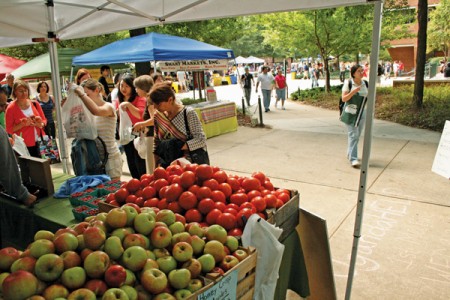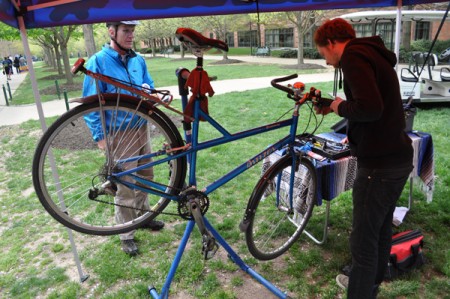Jason Von Kundra, Sustainability Intern
by Alex Tyson
July 2011
For many young activists, the environmental movement is something they get involved with in their late teens. While they may have joined environmental groups in high school, the transition to becoming a full-fledged environmentalist usually doesn’t occur until college. This was not the case for Jason Von-Kundra.
Jason was born on a fall day in Fairfax, Virginia to a mother who currently teaches classes in Southwest Virginia about Permaculture, a principled design system for ecological living which strives to integrate ecologically sustainable qualities into our individual lives and communities. To say Jason was conscious of the environment at a young age would be something of an understatement. In fact, Jason credits childhood experiences for leading him to his current work. While other kids traveled outside armed with their My Little Pony or Power Rangers backpacks, Jason brought a different kind of bag: a recycling one. As Jason put it, “I was raised to recycle. Whenever we went to the mall, my mom would make us take our recycling bags. We would just carry them around.” And carry he did. No matter whether Jason was in Mechanicsburg, Pennsylvania, where he attended high school, or back in Fairfax, Jason has always been passionate about environmental protection.
When Jason arrived at Mason after transferring from Northern Virginia Community College, Jason initially thought he would major in physics After some time he considered geology. Yet, his zeal for environmental protection couldn’t be satiated. As Jason noted, “My background is looking at the science of the issue.” Jason felt that his penchant for logical reasoning would be advantageous when studying environmental science. His sharply analytical mind was noticed; Jason was elected co-chair of the Environmental Action Group (EAG) after just one semester in Fall 2009. Within his first week in the club, Jason jumped at the opportunity to help organize Virginia Powershift, a conference for students and youth that informed students about pressing environmental and social justice issues. Since then, Jason has hardly slowed down. After Powershift, Jason helped lead a sustainable food campaign on campus. As part of the campaign, Jason met with dining staff and personnel, and lobbied dining services to include more vegetarian and vegan options on campus. His efforts on behalf of the EAG have helped steer dining services to lay groundwork for the establishment a new vegetarian restaurant on campus.
In addition to his previous achievements, Jason’s biggest accomplishment has just been made public. After lobbying the administration for nearly three years, the EAG helped pass the Patriot Green Fund. The Patriot Green Fund came about after students at Mason began to develop a strong interest in raising additional funds to enable Mason to move ahead in executing projects to reduce Mason’ greenhouse gas emissions. Students proposed the Patriot Green Fund, which was to assess a small fee per student to support this desire. The administration agreed with the students that more funding was needed, and requested the creation of a pilot for the Patriot Green Fund. As of July 1, 2011, the Budget and Planning Committee will provide $100,000 per year to accelerate our ability to achieve our goals outlined in CAP. This fund will significantly expand efforts to bring Mason into the sustainable future that faculty, students and President Merten are calling for, while allowing students to play a direct and important role in deciding which projects will be funded.
To Jason, the establishment of the fund signifies coming a step closer to his vision of Mason in the future. According to Jason, “ My favorite things about Mason are the incredible community of passionate students, faculty, and staff that are working hard to create positive social change, for the environment and other issues.” To him, the PGF and the community that helped pass it are integral to helping create a sustainable Mason. Jason states, “ I want to make Mason sustainable in a way where we have a close-loop system. {By} actually using the gardens on campus. Providing the food in cafeterias. Composting it down, using the soil to fertilize plants so we can provide our needs on our own.”
As a full-time student who has consistently worked throughout college (presently at the Office of Sustainability), one might wonder how Jason manages to do so much. Jason asserts that his tireless work ethic comes from an intrinsic force within, and a particular visit to coalfields in Appalachia. When defining the moment in his life that changed his outlook most significantly, Jason quips “One of the most important moments of my life was going out to climate ground zero, the Appalachian coal fields plagued with mountaintop removal. There I made the decision that I will do whatever it takes to protect our planet and its inhabitants.” This shocking vision of environmental degradation fueled Jason’s fire. Jason states, “I’m motivated to preserve the planet for future generations. We’re taught to pick up after ourselves. But we haven’t been doing that. We’re handing a planet to the next generation that isn’t in the same condition it is now. Why I do what I do is to enable future generations to have an inhabitable, clean, safe planet to live on. Your family is the most important thing in the world. I want to have kids one day. I think they deserve the same things what I was given.”

